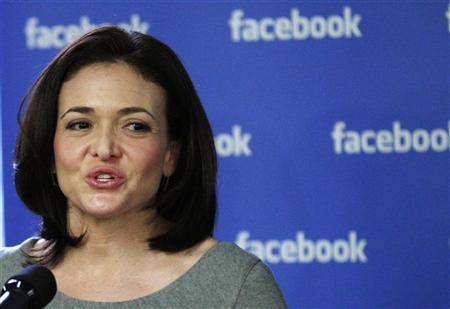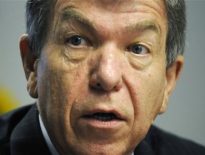(Reuters) – Facebook Inc named Chief Operating Officer Sheryl Sandberg a director on Monday, elevating the first woman to a board that includes seven men.

For years one of the most vocal critics of the gender imbalance in Silicon Valley’s executive ranks, Sandberg, 42, joined Facebook in 2008 and played a central role in guiding the social networking company to its $16 billion IPO in May.
Her promotion comes as Facebook seeks to cultivate a more mature image as opposed to the college dorm-room startup reputation that has dogged the company since Harvard dropout Mark Zuckerberg founded it in 2004.
“Sheryl has been my partner in running Facebook and has been central to our growth and success over the years,” Zuckerberg, 28, said in a statement. “Her understanding of our mission and long-term opportunity, and her experience both at Facebook and on public company boards makes her a natural fit for our board.”
Still, even after Facebook elevated Sandberg on Monday, the composition of its board remains a continuing point of scrutiny for a young company that has touched countless industries and boasts close to a billion users from every corner of the world.
The California State Teachers’ Retirement System, the second-largest largest pension fund in the United States, which owns 36,922 shares of Facebook, applauded Sandberg’s promotion, but urged the company to “continue diversifying the board toward greater independence and representation of the Company’s user base.”
Apart from Sandberg, the company’s board is made up of seven Caucasian men, largely Silicon Valley insiders aligned closely with Zuckerberg. They include Zuckerberg himself; venture capitalists James W. Breyer, Marc Andreessen and Peter Thiel; Washington Post Co chairman, Donald E. Graham; Netflix CEO Reed Hastings; and Erskine Bowles, a former White House chief of staff and the University of North Carolina president emeritus.
“We are optimistic Facebook is on its way to further expanding the board while simultaneously creating the diversity and independence we think is important to the future sustainability of this vibrant company,” said Jack Ehnes, CEO of the California State Teachers’ Retirement System. But, he added, “We’re not there yet.”
Prior to joining Facebook to lead its business operations, Sandberg worked at Google, where she was credited with building the search advertising division into a massively lucrative cornerstone of the web giant’s business.
She has been tasked with stoking similar growth at Facebook, which claimed $3.7 billion in revenue last year, but is under pressure to justify its $70 billion valuation in the public markets.
At the same time, Facebook hopes the promotion of one of corporate America’s most high-profile women will go some way to allay over its own gender issues, especially given Sandberg’s advocacy on the subject.
In February, before Facebook went public, the teachers’ retirement system openly urged the company to diversify its board to include women and said then the makeup of the all-male panel was “disappointing.”
In April, the women’s rights group UltraViolet held a protest outside Facebook’s New York offices over the same issue.
The Menlo Park-based company faced embarrassment as recently as last week when the Wall Street Journal published advance excerpts of a memoir by Katherine Losse, an early employee, who recounted being harassed and propositioned by male co-workers until Sandberg intervened when she came onboard.
In recent years, Sandberg’s clout within Facebook has been unquestioned while she has also served as its public face, often in place of the sometimes socially-awkward Zuckerberg, who has focused on improving Facebook’s product.
Meanwhile, Sandberg has represented the company at events like the World Economic Forum in Davos, Switzerland, where she led a panel on women’s advancement in January.
A former chief of staff to Treasury Secretary Lawrence Summers during the Clinton administration, Sandberg holds seats on the board of Walt Disney Co and several non-profit organizations.
“Facebook is working every day to make the world more open and connected,” she said in a statement. “It’s a mission that I’m deeply passionate about and I feel fortunate to be part of a company that is having such a profound impact in the world.”
Under Sandberg’s stewardship, Facebook navigated its rocky IPO in May, but still faces a litany of growing pains, chief among them are its regular brushes with privacy controversies that threaten to erode the eight year-old service’s popularity.
On Monday, the social network was again subject to fresh accusations that it had tampered with user privacy by changing the email contact listed for every user to a facebook.com address without notification.
Facebook defended the move, saying it was part of a broader, earlier effort to enhance “consistency” to the service.
“As we announced back in April, we’ve been updating addresses on Facebook to make them consistent across our site,” a Facebook spokeswoman said. “In addition to everyone receiving an address, we’re also rolling out a new setting that gives people the choice to decide which addresses they want to show on their timelines.”
Facebook shares closed down 3 percent at $32.06 on Monday, still more than 15 percent off of its May offering price despite a rebound in recent weeks.
(Reporting by Gerry Shih, Poornima Gupta and Matthew Keys; Editing by Matt Driskill)





